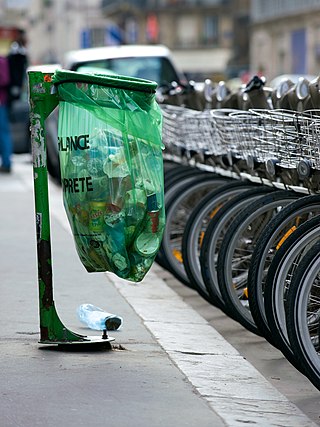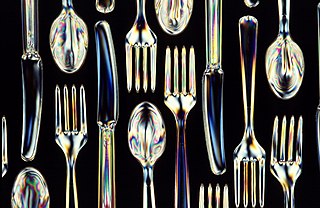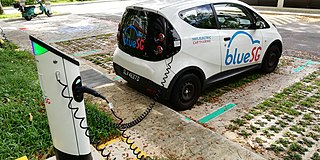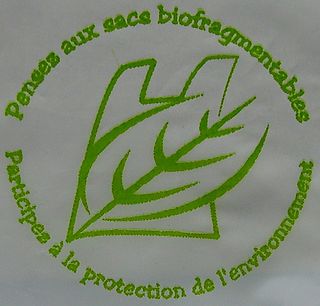
Biodegradation is the breakdown of organic matter by microorganisms, such as bacteria and fungi. It is generally assumed to be a natural process, which differentiates it from composting. Composting is a human-driven process in which biodegradation occurs under a specific set of circumstances.

A bin bag, rubbish bag, garbage bag, bin liner, trash bag or refuse sack is a disposable receptable for solid waste. These bags are useful to line the insides of waste containers to prevent the insides of the container from becoming coated in waste material. Most bags today are made out of plastic, and are typically black, white, or green in color.

Bioplastics are plastic materials produced from renewable biomass sources, such as vegetable fats and oils, corn starch and rice starch, straw, woodchips, sawdust, recycled food waste, etc. Some bioplastics are obtained by processing directly from natural biopolymers including polysaccharides and proteins, while others are chemically synthesized from sugar derivatives and lipids from either plants or animals, or biologically generated by fermentation of sugars or lipids. In contrast, common plastics, such as fossil-fuel plastics are derived from petroleum or natural gas.

Waste-to-energy (WtE) or energy-from-waste (EfW) refers to a series of processes designed to convert waste materials into usable forms of energy, typically electricity or heat. As a form of energy recovery, WtE plays a crucial role in both waste management and sustainable energy production by reducing the volume of waste in landfills and providing an alternative energy source.

Clean technology, also called cleantech or climatetech, is any process, product, or service that reduces negative environmental impacts through significant energy efficiency improvements, the sustainable use of resources, or environmental protection activities. Clean technology includes a broad range of technology related to recycling, renewable energy, information technology, green transportation, electric motors, green chemistry, lighting, grey water, and more. Environmental finance is a method by which new clean technology projects can obtain financing through the generation of carbon credits. A project that is developed with concern for climate change mitigation is also known as a carbon project.
Polyethylene or polythene film biodegrades naturally, albeit over a long period of time. Methods are available to make it more degradable under certain conditions of sunlight, moisture, oxygen, and composting and enhancement of biodegradation by reducing the hydrophobic polymer and increasing hydrophilic properties.

Biodegradable waste includes any organic matter in waste which can be broken down into carbon dioxide, water, methane, compost, humus, and simple organic molecules by micro-organisms and other living things by composting, aerobic digestion, anaerobic digestion or similar processes. It mainly includes kitchen waste, ash, soil, dung and other plant matter. In waste management, it also includes some inorganic materials which can be decomposed by bacteria. Such materials include gypsum and its products such as plasterboard and other simple sulfates which can be decomposed by sulfate reducing bacteria to yield hydrogen sulfide in anaerobic land-fill conditions.

Biodegradable plastics are plastics that can be decomposed by the action of living organisms, usually microbes, into water, carbon dioxide, and biomass. Biodegradable plastics are commonly produced with renewable raw materials, micro-organisms, petrochemicals, or combinations of all three.
A waste autoclave is a form of solid waste treatment that uses heat, steam and pressure of an industrial autoclave in the processing of waste. Waste autoclaves process waste either in batches or in continuous-flow processes. In batch processes, saturated steam is pumped into the autoclave at temperatures around 160 °C, or 320 °F. The steam pressure in the vessel is maintained up to 6 bars (gauge) for a period of up to 45 minutes to allow the process to fully 'cook' the waste. The autoclave process gives a very high pathogen and virus kill rate, although the fibrous products which come from the process are susceptible to bacteria and fungus as they are high in starch, cellulose and amino acids. When designed for sterilizing waste containing mostly liquids, a waste autoclave is known as an Effluent Decontamination System.

Sustainable packaging is packaging materials and methods that result in improved sustainability. This involves increased use of life cycle inventory (LCI) and life cycle assessment (LCA) to help guide the use of packaging which reduces the environmental impact and ecological footprint. It includes a look at the whole of the supply chain: from basic function, to marketing, and then through to end of life (LCA) and rebirth. Additionally, an eco-cost to value ratio can be useful The goals are to improve the long term viability and quality of life for humans and the longevity of natural ecosystems. Sustainable packaging must meet the functional and economic needs of the present without compromising the ability of future generations to meet their own needs. Sustainability is not necessarily an end state but is a continuing process of improvement.

Biodegradable bags are bags that are capable of being decomposed by bacteria or other living organisms.

Plastics are a wide range of synthetic or semi-synthetic materials that use polymers as a main ingredient. Their plasticity makes it possible for plastics to be molded, extruded or pressed into solid objects of various shapes. This adaptability, plus a wide range of other properties, such as being lightweight, durable, flexible, and inexpensive to produce, has led to their widespread use. Plastics typically are made through human industrial systems. Most modern plastics are derived from fossil fuel-based chemicals like natural gas or petroleum; however, recent industrial methods use variants made from renewable materials, such as corn or cotton derivatives.

Gevo, Inc. is an American renewable chemicals and advanced biofuels company headquartered in unincorporated Douglas County, Colorado, in the Denver-Aurora metropolitan area. Gevo operates in the sustainability sector, pursuing a business model based on the concept of the "circular economy". The company develops bio-based alternatives to petroleum-based products using a combination of biotechnology and classical chemistry. Gevo uses the GREET model from Argonne National Laboratory as a basis for its measure of sustainability, with the goal of producing high-protein animal feed, corn-oil products, and energy-dense liquid hydrocarbons. Gevo is focused on converting sustainably grown raw materials, specifically No. 2 dent corn, into high-value protein and isobutanol, a primary building block for renewable hydrocarbons, including sustainable aviation fuel, renewable gasoline, and renewable diesel. Gevo markets these fuels as directly integrable on a “drop-in” basis into existing fuel and chemical products.

Plastic pollution is the accumulation of plastic objects and particles in the Earth's environment that adversely affects humans, wildlife and their habitat. Plastics that act as pollutants are categorized by size into micro-, meso-, or macro debris. Plastics are inexpensive and durable, making them very adaptable for different uses; as a result, manufacturers choose to use plastic over other materials. However, the chemical structure of most plastics renders them resistant to many natural processes of degradation and as a result they are slow to degrade. Together, these two factors allow large volumes of plastic to enter the environment as mismanaged waste which persists in the ecosystem and travels throughout food webs.
Biodegradable additives are additives that enhance the biodegradation of polymers by allowing microorganisms to utilize the carbon within the polymer chain as a source of energy. Biodegradable additives attract microorganisms to the polymer through quorum sensing after biofilm creation on the plastic product. Additives are generally in masterbatch formation that use carrier resins such as polyethylene (PE), polypropylene (PP), polystyrene (PS) or polyethylene terephthalate (PET).

Conservation and restoration of objects made from plastics is work dedicated to the conservation of objects of historical and personal value made from plastics. When applied to cultural heritage, this activity is generally undertaken by a conservator-restorer.
Lisa Dyson is an American scientist, physicist, and entrepreneur. She is the founder and CEO of Kiverdi, a biotechnology company that uses carbon transformation technologies to develop sustainable products for commercial applications, including agriculture, plastics, and biodegradable materials. She is also the founder and CEO of Air Protein, a spin-off company from Kiverdi, which seeks to produce sustainable meat alternatives from elements found in air.

Synthetic microbial consortia or Synthetic microbial communities are multi-population systems that can contain a diverse range of microbial species, and are adjustable to serve a variety of industrial, ecological, and tautological interests. For synthetic biology, consortia take the ability to engineer novel cell behaviors to a population level.

Polymateria Ltd is a British technology company developing biodegradable plastic alternatives. In 2020, the privately owned company was the first to achieve certified biodegradation of the most commonly-littered forms of plastic packaging in real-world conditions, in less than a year without creating microplastics.

Footprint is a materials science organization that engineers fiber-based packaging in an effort to address the environmental crisis of plastic pollution. Its plant-based fiber alternatives to plastic are made from sources like double-lined kraft. These can be compostable, biodegradable, and recyclable. Footprint operates in the United States, Europe and Mexico.















